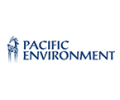Pacific Environment experts weigh in on shipping decarbonization

Pacific Environment staff provide expertise on the state and local, federal and international levels with respect to moving shipping and ports towards zero-emission infrastructure and cargo ships.
Just this week, Pacific Environment experts, Singapore Climate Specialist Abigail Goh, and Federal Climate Policy Director Antonio Santos were highlighted in Bunkerspot – a key source of quality information for all professionals working in the international bunker industry.
Antonio Santos was quoted in Bunkerspot’s 2024 survey where he stressed that committed individuals – and governments – should continue to force the pace of decarbonization at the International Maritime Organization, saying that: ‘While the 2023 IMO GHG Strategy represents a significant improvement over the previous 2018 strategy and sends a strong signal to the shipping industry that they must reduce their GHG emissions, the strategy lacks alignment with the Paris Agreement’s 1.5°C temperature-warming limit to avoid the worst impacts of climate change. As the IMO now moves forward in its negotiations to finalise technical and economic measures to meet the levels of ambition agreed to in the strategy, member states and other stakeholders must work together to put in place clear and effective regulations that will transition the industry away from the use of fossil fuels.”
He also said adoption of the 2023 IMO GHG Strategy doesn’t preclude individual countries from setting their our own requirements, remarking that: “Pacific Environment and our allies continue to advocate for domestic action to accelerate shipping decarbonization, including calling on the Biden administration to issue an Executive Order with specific actions that will unlock opportunities and innovation for decarbonizing the maritime sector.”
Additionally, he emphasized that: ‘The climate emergency is too urgent not to go as directly and rapidly as possible toward zero-emission solutions like green e-fuels and electrification’
In Leading the Way, a piece by Abigail Goh, she spotlights Singapore’s efforts on maritime decarbonisation and considers how the island nation can lead and build a global zero-emission shipping future.
She calls out a number of ways that Singapore has led in shipping and in shipping decarbonization, saying: “Singapore has always been one of the world’s most important maritime capitals, making it consequential to shipping’s decarbonisation prospects. Located at the tip of the Straits of Malacca and between the Indian and Pacific Oceans, the island city-state historically served as a vital node in world trade and shipping. Today, it is a major maritime hub that also serves as the world’s busiest container transshipment and bunkering port. In 2022, it handled 37.3 million TEUs of cargo and sold nearly 50 million metric tons of bunker fuel — or about 20% of the global bunker market.”
She calls Singapore the “indisputably leading Asian port when it comes to establishing and promoting green shipping corridors” and highlights the maritime research centres that MPA helped establish the now well-known Global Centre for Maritime Decarbonization.
She also recommends a few ways Singapore can do more, to further drive shipping-climate action. This includes the need to align with the Paris Agreement: “To keep 1.5oC alive, Pacific Environment and our environmental allies call for zero-emission shipping by 2040, and swift emissions cuts that peak emissions before 2025, as the Intergovernmental Panel on Climate Change recommends. Further, green shipping corridors must reject LNG pathways; as a fossil fuel that experts like the World Bank agree has questionable GHG and climate benefits, LNG’s role in shipping’s green transition is categorically limited, and related infrastructure will become expensive but stranded assets.”
She concluded: “As we mark the start of a new year, our window to fight the climate crisis is rapidly closing, and it is unclear if shipping will be up to the task. What’s clear is that Singapore will remain a crucial epicentre for maritime decarbonisation, a great port city which can —if it chooses — provide the leadership shipping needs to realise this critical transition.”
Source: Pacific Environment
